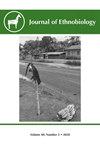科学家就土著和地方知识系统面临的威胁向人类发出警告
IF 1.3
3区 社会学
Q1 ANTHROPOLOGY
引用次数: 77
摘要
摘要土著人民和地方社区的知识体系和做法在保护我们星球的生物和文化多样性方面发挥着关键作用。全球化、政府政策、资本主义、殖民主义和其他快速的社会生态变化威胁着土著人民与当地社区及其环境之间的关系,从而挑战着土著和地方知识的连续性和活力。在这篇文章中,我们为世界科学家联盟发布的“世界科学家对人类的警告”做出贡献,通过探索代表我们星球未来管理的维持ILK系统的机会。我们的警告对知识和实践的普遍和无处不在的侵蚀以及这种侵蚀的社会和生态后果提出了警告。虽然ILK系统具有适应性和弹性,但这些知识系统的基础受到生物文化遗产的持续压制、歪曲、挪用、同化、脱节和破坏的损害。三个案例研究说明了这些过程,以及保护ILK如何成为生物文化保护的核心。最后,我们提出了15项建议,呼吁承认和支持土著人民和当地社区及其知识体系。制定这些建议将需要在如何承认、肯定和重视ILK系统、其知识持有人及其在土地和水域中的多种表现方面进行变革性和持续的转变。我们呼吁采取紧急行动,支持世界各地土著人民和当地社区的努力,以维护他们的知识体系、语言、管理权、与土地和水域的联系,以及他们领土的生物文化完整性——我们都依赖于这些。本文章由计算机程序翻译,如有差异,请以英文原文为准。
Scientists' Warning to Humanity on Threats to Indigenous and Local Knowledge Systems
Abstract. The knowledge systems and practices of Indigenous Peoples and local communities play critical roles in safeguarding the biological and cultural diversity of our planet. Globalization, government policies, capitalism, colonialism, and other rapid social-ecological changes threaten the relationships between Indigenous Peoples and local communities and their environments, thereby challenging the continuity and dynamism of Indigenous and Local Knowledge (ILK). In this article, we contribute to the “World Scientists' Warning to Humanity,” issued by the Alliance of World Scientists, by exploring opportunities for sustaining ILK systems on behalf of the future stewardship of our planet. Our warning raises the alarm about the pervasive and ubiquitous erosion of knowledge and practice and the social and ecological consequences of this erosion. While ILK systems can be adaptable and resilient, the foundations of these knowledge systems are compromised by ongoing suppression, misrepresentation, appropriation, assimilation, disconnection, and destruction of biocultural heritage. Three case studies illustrate these processes and how protecting ILK is central to biocultural conservation. We conclude with 15 recommendations that call for the recognition and support of Indigenous Peoples and local communities and their knowledge systems. Enacting these recommendations will entail a transformative and sustained shift in how ILK systems, their knowledge holders, and their multiple expressions in lands and waters are recognized, affirmed, and valued. We appeal for urgent action to support the efforts of Indigenous Peoples and local communities around the world to maintain their knowledge systems, languages, stewardship rights, ties to lands and waters, and the biocultural integrity of their territories—on which we all depend.
求助全文
通过发布文献求助,成功后即可免费获取论文全文。
去求助
来源期刊

Journal of Ethnobiology
Social Sciences-Anthropology
CiteScore
4.80
自引率
3.40%
发文量
21
审稿时长
>12 weeks
期刊介绍:
JoE’s readership is as wide and diverse as ethnobiology itself, with readers spanning from both the natural and social sciences. Not surprisingly, a glance at the papers published in the Journal reveals the depth and breadth of topics, extending from studies in archaeology and the origins of agriculture, to folk classification systems, to food composition, plants, birds, mammals, fungi and everything in between.
Research areas published in JoE include but are not limited to neo- and paleo-ethnobiology, zooarchaeology, ethnobotany, ethnozoology, ethnopharmacology, ethnoecology, linguistic ethnobiology, human paleoecology, and many other related fields of study within anthropology and biology, such as taxonomy, conservation biology, ethnography, political ecology, and cognitive and cultural anthropology.
JoE does not limit itself to a single perspective, approach or discipline, but seeks to represent the full spectrum and wide diversity of the field of ethnobiology, including cognitive, symbolic, linguistic, ecological, and economic aspects of human interactions with our living world. Articles that significantly advance ethnobiological theory and/or methodology are particularly welcome, as well as studies bridging across disciplines and knowledge systems. JoE does not publish uncontextualized data such as species lists; appropriate submissions must elaborate on the ethnobiological context of findings.
 求助内容:
求助内容: 应助结果提醒方式:
应助结果提醒方式:


